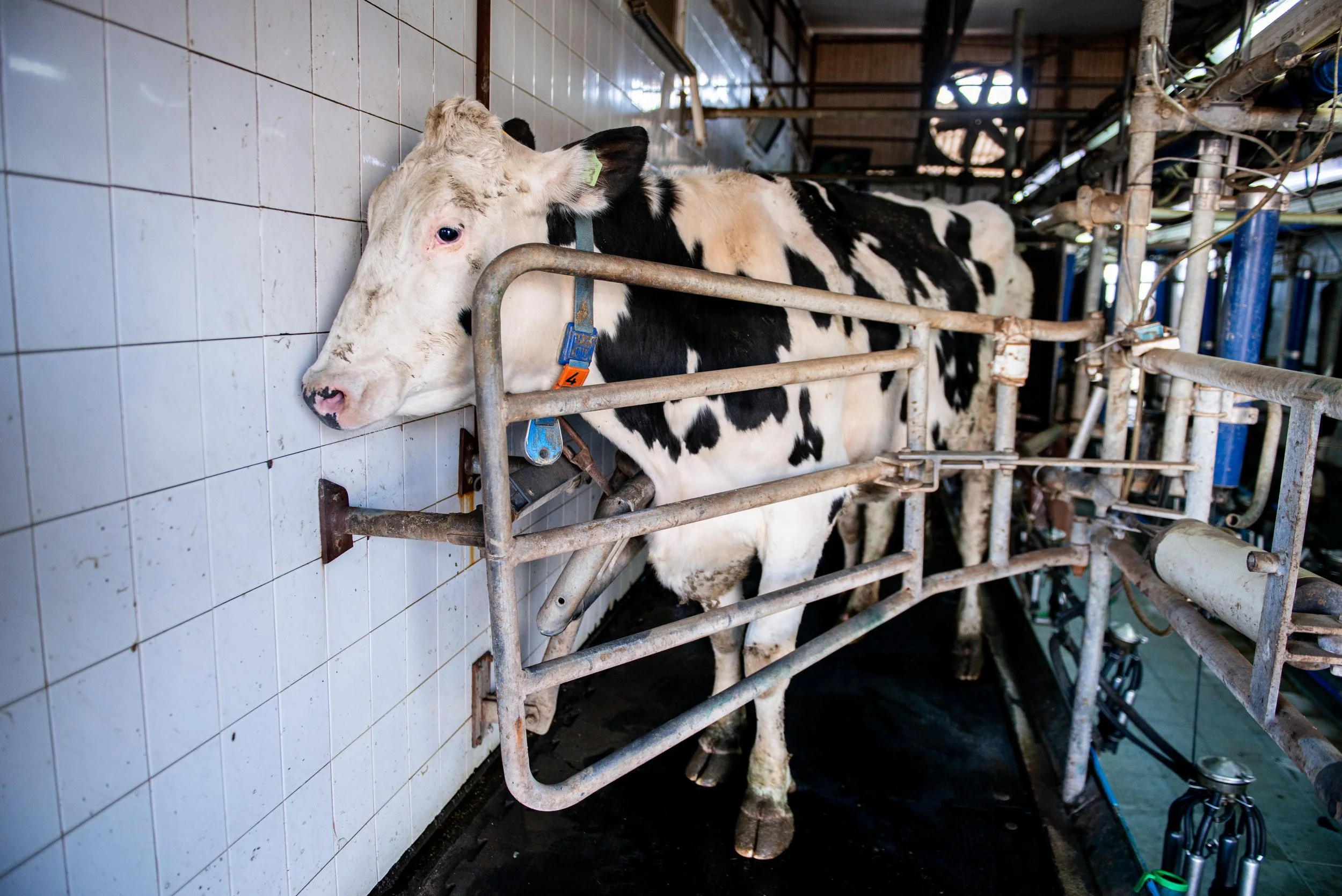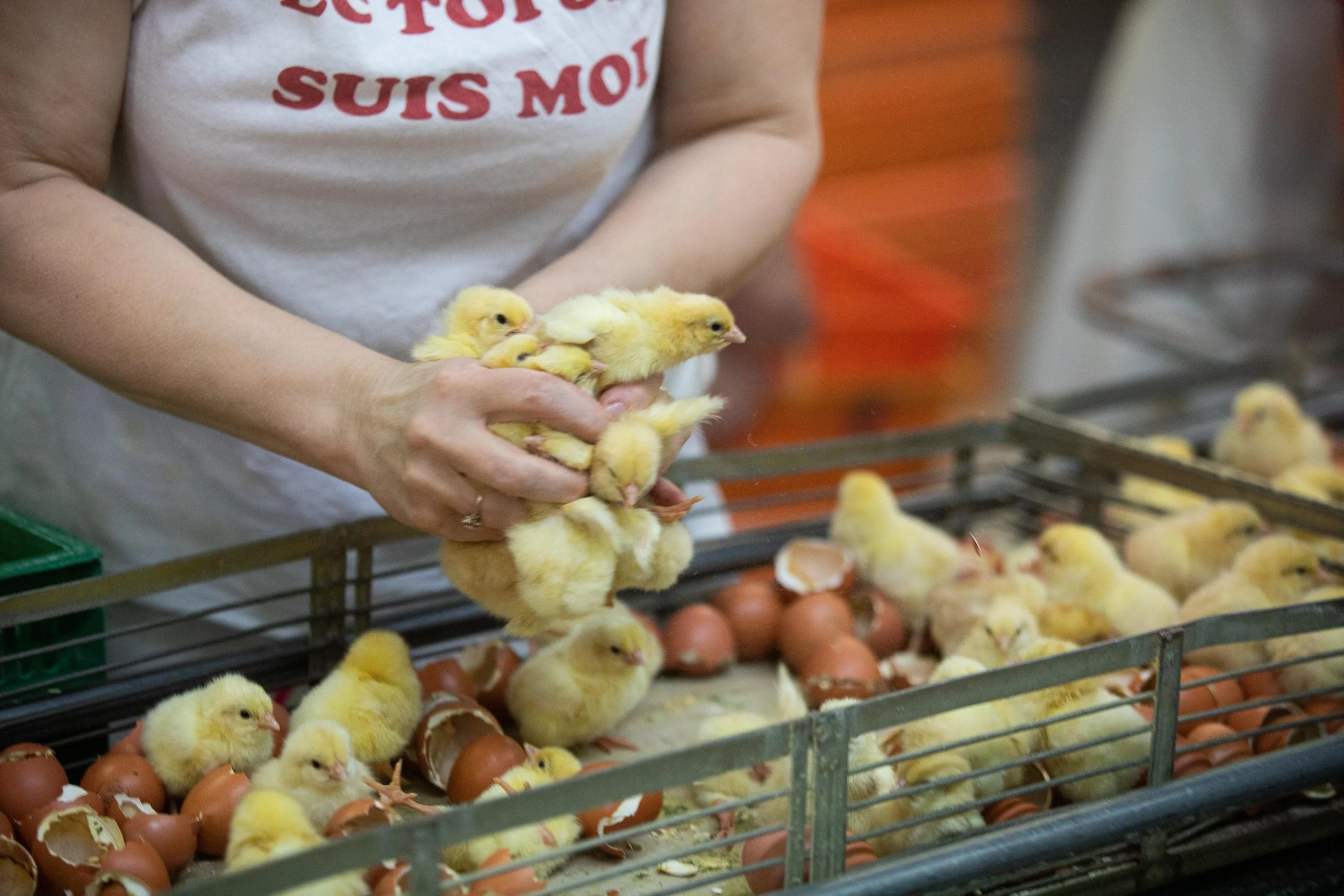That’s what you are (still) responsible for
Why vegan?
Because animals are not here for us.
Their lives are not worth less just because they’re not humans
Because we know what happens in animal agriculture - and we’re responsible!
Not being vegan means: actively causing harm!
Living as a vegan means: deciding against cruelty to animals!
Not vegan = ethically wrong?
Speciesism is the discrimination of sentient beings based on their species.
Just like racism or sexism causes harm to others, so does speciesism.
Just because these animals aren't human doesn't mean they can be exploited.
Those who consume animal products cause:
Captivity and control
Pain, fear, and exploitation
Death for profit
No animal product is free from animal suffering.
Not even "organic," "happy," or "fair" – those are just words meant to reassure you.
They don’t help the animals!
What happens in the animal industries?
-
Cows are artificially impregnated against their will ("rape rack").
Calves are taken away from their mothers immediately after birth.
Male calves, since they don’t produce milk, are either killed right after birth or after a few months for their meat.
Their bodies are exploited until they are "worn out" – then they are slaughtered at the slaughterhouse.
-
Laying hens are bred for high performance – extreme physical strain.
Male chicks are killed because they don’t lay eggs, either right after birth or after a few weeks (42 days) for their meat.
Even “organic” means: killed when they produce fewer eggs.
-
All animals are violently forced to die – after only a fraction of their natural life expectancy – young and full of a will to live.
They see, smell, and hear others being killed before them.
No murder for meat is “humane.”
-
Animals are locked up, trained, and put on display.
In captivity, they develop behavioral disorders (pacing, head-banging).
This is not education – it’s entertainment at the expense of life.
A cage is not a home. Not even with colorful balloons.
-
Millions of animals are killed every year for leather – mostly cows, under brutal conditions.
Fur usually comes from animals kept in tiny cages, often skinned alive.
Leather is not a byproduct – it’s a separate industry built on immense suffering.
If it’s not your body, it’s not your clothing.
-
Sheep are bred to produce far more wool than their bodies can bear.
They are shorn ruthlessly and under time pressure – often brutally, causing injuries.
In the end, they too are slaughtered.
For silk, silkworms are boiled alive – billions every year.
Even the “soft” products cost lives.
-
Bees are artificially bred and controlled.
The honey that belongs to them is replaced with sugar water – leading to health consequences.
Many are injured or killed during harvesting.
Bees are not production machines –
they live for themselves, not for us. -
Fish suffocate slowly, consciously – or are cut open while still alive.
Millions of tons of bycatch: animals nobody wants – but who must die anyway.
Fish farms are industrial hells for sentient beings.
Millions of lives are taken every day – not just fish, but also crabs, octopuses, mussels.
Many are boiled or cut open alive.
New studies show: crabs and octopuses also feel pain and fear.
Underwater, the suffering is just as real –
we just see it less often. -
Animals are bred, sold, and given away – often like merchandise.
Many end up in shelters, are abandoned, or euthanized.
Exotic animals suffer especially – from improper care, loneliness, and misunderstanding.
Love can't be bought –
and no animal wants to live in captivity. -
Horses are forced to endure hours of city noise, heat, and exhaust fumes.
Many suffer from joint damage, overheating, and stress.
Leisure-time romance – paid for with a life of coercion.
Tradition is no excuse for exploitation.
-
Horses and ponies are forced to perform – with reins, spurs, and violence.
Riding seems harmless but often means control, pain, and psychological pressure.
Even in therapy: the animal is used – not willingly.
If you love someone, you don’t force them to carry you.
Even under the best conditions, the value of animals’ lives depends solely on their usefulness to humans!
Common Excuses – Clear Answers
-
Possible, yes. But just because we can do something doesn’t mean we should.
We don’t need animal products – so there’s no reason to kill animals.
-
Even there, animals are killed – completely unnecessarily.
If an animal has to die so you can eat something you don’t need – is that really “fair”? -
Liebe zeigt sich im Handeln.
Wer Tiere liebt, isst sie nicht – und lässt sie leben. -
Yes – but we are not lions.
Lions don’t have supermarkets, morals, or choices.
We do. And with choice comes responsibility. -
Plants don’t have a central nervous system, a brain, or consciousness.
Animals have all of these – they suffer, fear, and want to live.
And: animal products cause even more plant consumption (through feed). -
A little violence is still violence.
For every animal, it’s 100% of their life.
You don’t need it – so why at all? -
Taste doesn’t justify suffering.
When the victim has no voice, your enjoyment isn’t a good argument.
Today, there are vegan alternatives that taste just as good – without guilt. -
What’s more extreme:
not eating cheese – or separating newborn calves, killing cows, and eating them?
Veganism is not extreme. Animal exploitation is. -
Even on organic farms, animals die.
They are also killed there when they’re no longer “useful.”
Ethics don’t stop at the barn door. -
One doesn’t exclude the other.
Empathy is not a limited resource.
Living vegan is also good for people: climate, water, justice. -
Maybe you think that – until you try.
Millions of people worldwide prove: it’s possible. -
We all die – but that doesn’t mean we want to be killed.
An animal’s life has value – not just for you, but for itself.
What you can do
🌱 Be vegan.
No exploitation, no killing, no looking away.
Living vegan is easier today than ever – inform yourself, find alternatives, take action.
📣 Be active.
Join actions, change something with us.
Talk to others. Show compassion.
Every voice counts – including yours.











